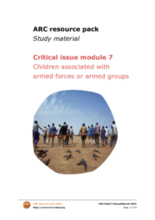Introduction
Facilitators who have not recently trained or worked in the area covered by this module should read carefully through the various topics, slides, exercises, handouts and readings before starting to plan their training activity. Please note that these materials aim to stimulate learning and discussion, and should be used in conjunction with stated policy (they do not replace it). Trainers are encouraged to adapt the module to their specific geographical or cultural context and to supplement topics with their own or locally relevant material.
Despite a growing focus of international attention and wide condemnation of the practice, the recruitment and use of children in conflict continues across the world. Children are used in a variety of ways including support roles, as spies or informants, in active frontline fighting or for sexual purposes. Many of these children die or survive with a disability as a result of their experiences; for others the physical, emotional, developmental, mental and spiritual suffering and harm is immeasurable.
Progress has been made in several areas:
- an increase in awareness of the issues at community, national and international level
- a more inclusive response focusing on strengthening the capacity of communities to protect children
- a greater understanding of the underlying issues and ongoing efforts to incorporate lessons learnt into policy and programmes.
Recent research has listened to the voices of children, and programmes increasingly include their views and ideas in designing and developing responses. This is particularly important in addressing the complex needs of girls recruited and used by armed actors and is one way of recognising and building on the resilience of all children.
Considerable progress has also been made in relation to the development and application of legal provisions and standards relating to the recruitment and use of children. As of July 2009, 128 States are party to the optional protocol to the UN Convention on the rights of the child (CRC) on the involvement of children in armed conflict and a significant step towards ending impunity was made through the adoption of the statute of the International Criminal Court, which makes the conscripting or enlisting of children under the age of 15 years or using them to participate actively in hostilities a war crime, both in international and internal armed conflict and whether by armed forces or armed groups.
A robust approach that combines advocacy for the ratification and implementation of legal standards together with a longterm commitment to supporting communities is required to ensure the recruitment and rerecruitment of children is prevented and those children who have already been recruited are released, protected and provided with the support they need to successfully reintegrate into society.
The recruitment and use of children is a complex issue and can be extremely sensitive, bringing agencies into the political and military arena. A broad set of skills and knowledge is required to fully address not only the immediate child protection concerns but also the underlying causes which include poverty and lack of livelihoods, family separation or breakdown and lack of access to education. An understanding of the law and judicial systems relevant to children is also important. Agencies seeking to prevent recruitment and support children associated with armed forces or armed groups have a responsibility to ensure that their actions are based on child rights and humanitarian principles. Agencies should also have systems in place to ensure quality programmes and minimum standards are applied.
This module does not attempt to address all areas fully but aims to support the development of skills and knowledge in relation to emergency aspects, and to provide information and links for those who require more detailed resources and guidance.

